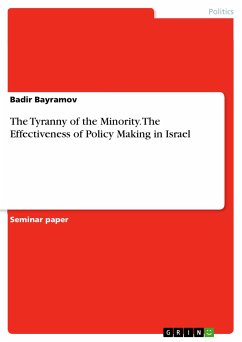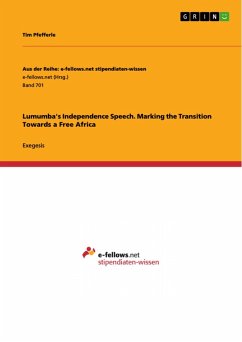
The Tyranny of the Minority. The Effectiveness of Policy Making in Israel (eBook, PDF)

PAYBACK Punkte
0 °P sammeln!
Seminar paper from the year 2013 in the subject Politics - Region: Near East, Near Orient, grade: 1,0, University of Potsdam, language: English, abstract: The Tyranny of the Minority: The effectiveness of policy making in Israel. Introduction to Israel's Political System As a fledgling nation facing a unique set of social challenges and physical threats, the democracy of Israel was created in an incredibly volatile environment. Nonetheless, in certain respects Israeli democracy has shown itself to be remarkably stable-for example, not once in Israel's sixty-five year history have the results o...
Seminar paper from the year 2013 in the subject Politics - Region: Near East, Near Orient, grade: 1,0, University of Potsdam, language: English, abstract: The Tyranny of the Minority: The effectiveness of policy making in Israel. Introduction to Israel's Political System As a fledgling nation facing a unique set of social challenges and physical threats, the democracy of Israel was created in an incredibly volatile environment. Nonetheless, in certain respects Israeli democracy has shown itself to be remarkably stable-for example, not once in Israel's sixty-five year history have the results of a major election been challenged. In other respects, however, Israeli democracy has presented itself as fundamentally unstable and subject to perpetual inefficiency. This is further exacerbated by the fact that unlike most Western democracies, the state of Israel lacks a formal constitution; instead, Israel has passed a set of Basic Laws intended to fill the gap. One symptom of this perpetually unstable condition is the frequency in which Israel changes the makeup of its governing coalitions-in Israel's brief history of sixty-five years, there have been thirty-one different governments. The question becomes, to what extent is such an erratic democracy able to set policy and govern effectively? In what follows, this question will be analyzed thoroughly, with an emphasis placed on the role that Israel's multiparty political system plays in this process. The political system in Israel is a parliamentary system based strictly on proportional representation. This was a system Israel adopted in the aftermath of the period of the British Mandate in order to accommodate the starkly different social, political and religious groups-and particularly the vast waves of immigrants-that composed its population. In Israel's parliamentary system, a party receives seats in the Knesset in proportion to the number of votes that they received in the legislative elections. Keeping in line with an accepted principle in political science known as Dueverger's law , this is a political system which tends to promote the existence of many parties, and Israeli democracy can serve as the poster child for this theory. In Israel's most recent legislative elections in January of 2013, thirty-four different parties were represented on the ballot, twelve of which passed the 2% electoral threshold and are currently sitting in the Knesset. The political system in Israel is further complicated by the complex interplay between the diverse religious, economic, political and social groups it possesses...
Dieser Download kann aus rechtlichen Gründen nur mit Rechnungsadresse in A, B, BG, CY, CZ, D, DK, EW, E, FIN, F, GR, HR, H, IRL, I, LT, L, LR, M, NL, PL, P, R, S, SLO, SK ausgeliefert werden.













